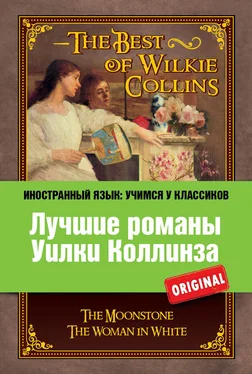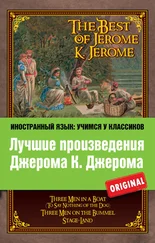“I’m better now,” she sighed, looking up at me quietly. “I forgive you.”
She joined her companion again, and they left the burial-ground. I saw them stop near the church and speak to the sexton’s wife, who had come from the cottage, and had waited, watching us from a distance. Then they went on again up the path that led to the moor. I looked after Anne Catherick as she disappeared, till all trace of her had faded in the twilight – looked as anxiously and sorrowfully as if that was the last I was to see in this weary world of the woman in white.
Half an hour later I was back at the house, and was informing Miss Halcombe of all that had happened.
She listened to me from beginning to end with a steady, silent attention, which, in a woman of her temperament and disposition, was the strongest proof that could be offered of the serious manner in which my narrative affected her.
“My mind misgives me,” was all she said when I had done. “My mind misgives me sadly about the future.”
“The future may depend,” I suggested, “on the use we make of the present. It is not improbable that Anne Catherick may speak more readily and unreservedly to a woman than she has spoken to me. If Miss Fairlie – ”
“Not to be thought of for a moment,” interposed Miss Halcombe, in her most decided manner.
“Let me suggest, then,” I continued, “that you should see Anne Catherick yourself, and do all you can to win her confidence. For my own part, I shrink from the idea of alarming the poor creature a second time, as I have most unhappily alarmed her already. Do you see any objection to accompanying me to the farmhouse to-morrow?”
“None whatever. I will go anywhere and do anything to serve Laura’s interests. What did you say the place was called?”
“You must know it well. It is called Todd’s Corner.”
“Certainly. Todd’s Corner is one of Mr. Fairlie’s farms. Our dairymaid here is the farmer’s second daughter. She goes backwards and forwards constantly between this house and her father’s farm, and she may have heard or seen something which it may be useful to us to know. Shall I ascertain, at once, if the girl is downstairs?”
She rang the bell, and sent the servant with his message. He returned, and announced that the dairymaid was then at the farm. She had not been there for the last three days, and the housekeeper had given her leave to go home for an hour or two that evening.
“I can speak to her to-morrow,” said Miss Halcombe, when the servant had left the room again. “In the meantime, let me thoroughly understand the object to be gained by my interview with Anne Catherick. Is there no doubt in your mind that the person who confined her in the Asylum was Sir Percival Glyde?”
“There is not the shadow of a doubt. The only mystery that remains is the mystery of his MOTIVE. Looking to the great difference between his station in life and hers, which seems to preclude all idea of the most distant relationship between them, it is of the last importance – even assuming that she really required to be placed under restraint – to know why HE should have been the person to assume the serious responsibility of shutting her up – ”
“In a private Asylum, I think you said?”
“Yes, in a private Asylum, where a sum of money, which no poor person could afford to give, must have been paid for her maintenance as a patient.”
“I see where the doubt lies, Mr. Hartright, and I promise you that it shall be set at rest, whether Anne Catherick assists us to-morrow or not. Sir Percival Glyde shall not be long in this house without satisfying Mr. Gilmore, and satisfying me. My sister’s future is my dearest care in life, and I have influence enough over her to give me some power, where her marriage is concerned, in the disposal of it.”
We parted for the night.
After breakfast the next morning, an obstacle, which the events of the evening before had put out of my memory, interposed to prevent our proceeding immediately to the farm. This was my last day at Limmeridge House, and it was necessary, as soon as the post came in, to follow Miss Halcombe’s advice, and to ask Mr. Fairlie’s permission to shorten my engagement by a month, in consideration of an unforeseen necessity for my return to London.
Fortunately for the probability of this excuse, so far as appearances were concerned, the post brought me two letters from London friends that morning. I took them away at once to my own room, and sent the servant with a message to Mr. Fairlie, requesting to know when I could see him on a matter of business.
I awaited the man’s return, free from the slightest feeling of anxiety about the manner in which his master might receive my application. With Mr. Fairlie’s leave or without it, I must go. The consciousness of having now taken the first step on the dreary journey which was henceforth to separate my life from Miss Fairlie’s seemed to have blunted my sensibility to every consideration connected with myself. I had done with my poor man’s touchy pride – I had done with all my little artist vanities. No insolence of Mr. Fairlie’s, if he chose to be insolent, could wound me now.
The servant returned with a message for which I was not unprepared. Mr. Fairlie regretted that the state of his health, on that particular morning, was such as to preclude all hope of his having the pleasure of receiving me. He begged, therefore, that I would accept his apologies, and kindly communicate what I had to say in the form of a letter. Similar messages to this had reached me, at various intervals, during my three months’ residence in the house. Throughout the whole of that period Mr. Fairlie had been rejoiced to “possess” me, but had never been well enough to see me for a second time. The servant took every fresh batch of drawings that I mounted and restored back to his master with my “respects,” and returned empty-handed with Mr. Fairlie’s “kind compliments,” “best thanks,” and “sincere regrets” that the state of his health still obliged him to remain a solitary prisoner in his own room. A more satisfactory arrangement to both sides could not possibly have been adopted. It would be hard to say which of us, under the circumstances, felt the most grateful sense of obligation to Mr. Fairlie’s accommodating nerves.
I sat down at once to write the letter, expressing myself in it as civilly, as clearly, and as briefly as possible. Mr. Fairlie did not hurry his reply. Nearly an hour elapsed before the answer was placed in my hands. It was written with beautiful regularity and neatness of character, in violet-coloured ink, on note-paper as smooth as ivory and almost as thick as cardboard, and it addressed me in these terms —
“Mr. Fairlie’s compliments to Mr. Hartright. Mr. Fairlie is more surprised and disappointed than he can say (in the present state of his health) by Mr. Hartright’s application. Mr. Fairlie is not a man of business, but he has consulted his steward, who is, and that person confirms Mr. Fairlie’s opinion that Mr. Hartright’s request to be allowed to break his engagement cannot be justified by any necessity whatever, excepting perhaps a case of life and death. If the highly-appreciative feeling towards Art and its professors, which it is the consolation and happiness of Mr. Fairlie’s suffering existence to cultivate, could be easily shaken, Mr. Hartright’s present proceeding would have shaken it. It has not done so – except in the instance of Mr. Hartright himself.
“Having stated his opinion – so far, that is to say, as acute nervous suffering will allow him to state anything – Mr. Fairlie has nothing to add but the expression of his decision, in reference to the highly irregular application that has been made to him. Perfect repose of body and mind being to the last degree important in his case, Mr. Fairlie will not suffer Mr. Hartright to disturb that repose by remaining in the house under circumstances of an essentially irritating nature to both sides. Accordingly, Mr. Fairlie waives his right of refusal, purely with a view to the preservation of his own tranquillity – and informs Mr. Hartright that he may go.”
Читать дальше
Конец ознакомительного отрывка
Купить книгу












